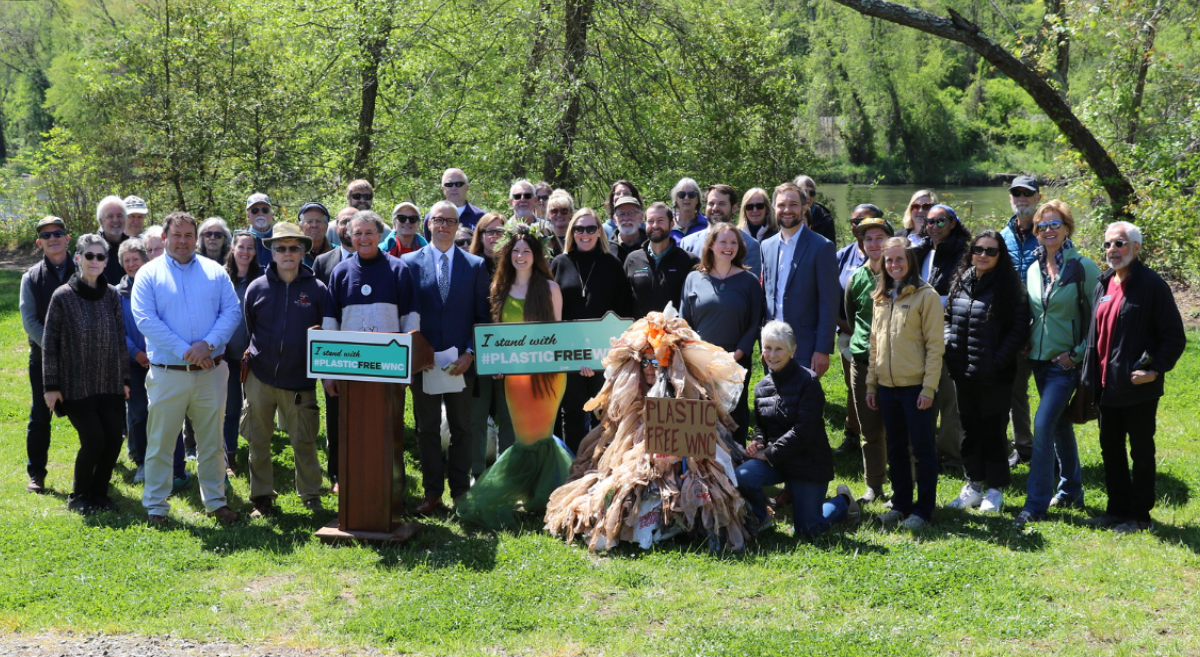Taking Action Against Plastic Pollution on Earth Day

Pictured: Local elected officials, MountainTrue staff, and community advocates pose with the French Broad Mermaid and the Plastic Bag Monster after the April 22 press conference in Woodfin, NC. Photo by Paul King.
On Earth Day, April 22, a coalition of local elected officials and community advocates gathered at Silverline Park in Woodfin, NC, to address the pressing issue of plastic pollution. In a united front, representatives from Buncombe County, the City of Asheville, and the towns of Weaverville and Woodfin announced local initiatives aimed at reducing reliance on harmful single-use plastics.
At the heart of their announcement was a commitment to phase out plastic bags, single-use plastics, and styrofoam, backed by new proclamations from local leaders. Speakers also called on residents and businesses to reduce their plastic footprint. This collective effort underscored the region’s dedication to the Earth Day 2024 theme, “Planet vs. Plastics,” emphasizing the urgent need for a clean and healthy environment in Western North Carolina.
The event featured a lineup of influential speakers, including Mayor Esther Manheimer and Councilwoman Maggie Ullman of the City of Asheville, Parker Sloan of the Buncombe County Board of Commissioners, Eric Ager State Representative from District 114, Caleb Rudow State Representative from District 116, Mayor Jim McAllister of Woodfin and Mayor Patrick Fitzsimmons of Weaverville, among others. Their presence highlighted the significance of collaborative action in tackling plastic pollution at both the local and state levels.
Why this issue is so important:
Plastic pollution isn’t just an environmental issue—it’s a public health crisis. Studies have linked plastic exposure to critical health risks, including heart disease, infertility, and various cancers.
Plastic pollution poses a significant threat to global ecosystems and public health. Recent studies have highlighted the pervasive impact of microplastics in terrestrial and marine environments, including their presence in the human food chain and bodies, with concerning concentrations detected in the French Broad River and other local waterways.
“We know that a significant volume of single-use plastic is discarded and becomes litter found in rivers, roadways, and other public and private areas throughout Asheville,” Mayor Esther Manheimer said.
Local efforts in cities like Asheville and counties like Buncombe to limit single-use plastics have been blocked by state-level preemptions. Now, with public support at our back, it’s time for statewide legislation that bans harmful plastics once and for all. Our health, our ecosystems, and the beauty of the Southern Blue Ridge Mountains depend on it.
We can reduce that pollution by passing common-sense laws. During Earth Month 2024, the local governments of Buncombe County, the City of Asheville, and the towns of Black Mountain, Weaverville, and Woodfin have taken meaningful steps to reduce their use of single-use plastics.
The Plastic-Free WNC coalition worked with Mason-Dixon Polling & Research to find out what North Carolina voters think about plastic; a significant majority expressed concern about the health impacts of plastics and said state lawmakers should take action to reduce single-use plastics. Support for state government action to reduce single-use plastics was widespread and bipartisan: More than eight out of ten (82%) North Carolinians support enacting policies to protect human health and the environment. Nearly three-quarters (74%) of Republican and 91% of Democratic voters support reducing single-use plastics.
Recent studies and media reports have linked the presence of plastics in the human body to obesity, heart attack, stroke, falling sperm counts, infertility, premature births, birth defects, developmental disorders, and possibly Parkinson’s and dementia. Nearly nine out of ten (88%) North Carolinians said they were concerned about the health effects of plastic, with 50 percent of those saying they were very concerned.
“Ensuring that our food, water, and environment are safe and free of dangerous plastic pollution is widely supported by young and old, women and men, and Republicans and Democrats,” said French Broad Riverkeeper Hartwell Carson. “With a resounding 82% of North Carolinians calling for action, it’s imperative that corporations quit forcing single-use plastics on us. We don’t want it. Sound policy can move us away from the detrimental impacts single-use plastics cause. In the meantime, businesses should be working to phase them out.”
These poll results mirror surveys conducted by the City of Asheville in 2023, which found that more than 80% of respondents supported a citywide plastic bag ban, and by the Outer Banks Chamber of Commerce (2017), in which all but two of 500 respondents opposed overturning a popular local bag ban.
The North Carolina General Assembly stripped local governments of their right to ban single-use plastic bags.
In 2023, Durham was on the cusp of passing a 10-cent fee on disposable plastic and paper bags. In Western North Carolina, Buncombe County, the City of Asheville, and the towns of Black Mountain, Weaverville, and Woodfin were moving toward enacting local ordinances that would ban single-use plastic shopping bags at the checkout aisle and styrofoam takeout containers.
As those local laws moved forward, Senate Leaders conspired with special interest lobbyists from the North Carolina Retail Merchants Association to insert language into the state budget blocking local governments from enacting any regulations on “the use, disposition, or sale of an auxiliary container (153A-145.11)”, including styrofoam containers and single-use plastic bags. The omnibus budget containing these new limits on local governments was released to the public and to the House and Senate for an up-or-down vote without opportunity for debate or amendment. Governor Roy Cooper later allowed it to become law without his signature.
Environmental and public health advocates around the state regrouped and are now focusing their efforts on building support for and passing a state-wide ban on single-use plastic bags and takeout containers.
“Our legislators have a constitutional duty to safeguard the health and well-being of the people of North Carolina. It’s time for North Carolina to join the more than 500 state and local governments across the United States that have already passed commonsense laws to reduce single-use plastics. This is not just an environmental imperative — it’s a public health necessity,” said Steve Wall, MD, a retired pediatrician and member of the Plastic-Free WNC Health Working Group.
Take action: stand up for a better future!
Every member of our community can play a part in this vital environmental endeavor; let’s continue to work together for a cleaner, healthier planet!
Contact Your State Legislators: It’s crucial that our voices are heard. Click here to email your NC Senators and Representatives and let them know that you stand with the majority of voters who demand urgent action on single-use plastics.
Spread the Message: Amplify our call to action on social media using #PlanetVsPlastics and #BanSingleUseNC, and encourage others to join this critical fight.

